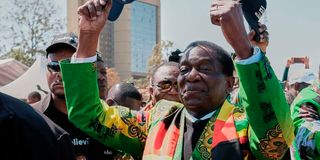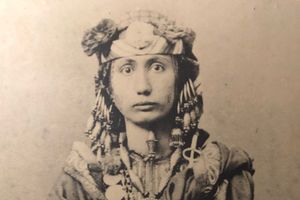Zanu PF accuses Zambia of 'pushing for a regime change' in Zimbabwe

Zimbabwean President and ZANU PF leader Emmerson Mnangagwa raises his cap in salute to the crowd gathered during a rally in Harare on August 9, 2023.
Zimbabwe’s ruling party has accused Zambia of being used by Western countries to push a regime change agenda in the region, after a Southern African Development Community (SADC) observer mission said Harare’s recent General Election failed to meet international standards.
The SADC Election Observer Mission (SEOM), led by former Zambian vice president Nevers Mumba, in its preliminary report said the conduct of the August 23 to 24 election fell short of the provisions of the southern African country’s constitution, electoral laws and regional protocols on free and fair elections.
President Emmerson Mnangagwa was at the weekend declared winner of the presidential election with 52.6 percent of the vote, but the result was rejected by his main rival Nelson Chamisa who garnered 44 percent.
Mr Chamisa said the announced results did not tally with his own figures that he said show that he won the election.
Foreign observer missions were unanimous that the polls were flawed as they cited the late delivery of election material in opposition strongholds of Bulawayo, Harare and Mutare.
President Mnangagwa’s government has publicly complained about reports by SADC and the European Union, which it says are biased.
However, the harshest criticism has been reserved for Mr Mumba and Zambian President Hakainde Hichilema, who are accused of trying to prop up Mr Chamisa and his Citizens Coalition for Change party.
Voting had to be extended by a day in a number of wards in Harare and Mutare where polling stations did not open on the initial polling day.
Observers also flagged the arrest of election observers who were carrying out an independent verification of results, intimidation of voters by a group linked to the ruling Zanu PF party, closure of the democratic space, and bias by the electoral commission, among other issues.
President Hichilema, as chairperson of the SADC Organ on Politics, Defence and Security Cooperation, appointed Mr Mumba to head the SEOM.
Christopher Mutsvangwa, the Zanu PF spokesperson, accused the Zambian leader of trying to use the mission to advance Western interests in the region.
“Well, look Mr Hichilema has got his own friends and he came to power through his own friends and he decided to appoint a man who decided to make controversy in Zimbabwe rather than observe elections and once became part of charade of the Western countries, which always want to see Zimbabwean elections as a transition away from Zanu PF rule to some puppetry in the West,” Mr Mutsvangwa told a South African television station.
“That is not going to happen in Zimbabwe…The reason why there has been persistent contestation is that the West would like to see the back of a national liberation movement in power in Zimbabwe and they expect the same thing eventually in South Africa, they will expect the same thing in Namibia, we know the game plan.”
He added: “I don’t know whether Mr Hichilema wants to become the new champion of Western neo-colonial interests in southern Africa or otherwise because you are trying to make him and his head of observers as unelected secretary generals of SADC.”
Senior Zimbabwean government officials have also taken to social media to attack Mr Mumba for allegedly trying to help the opposition to unseat Zanu PF.
On Thursday, the government’s main daily newspaper claimed the former Zambian VP had a “well-known history of clinical mental problems” and wondered how President Hichilema “picked him for chairmanship of such a sensitive mission and on a trip to a country like Zimbabwe whose election history is fraught.”
The SADC secretariat said it was worried about the personal attacks against Mr Mumba and emphasised that the preliminary statement on Zimbabwe was not a personal opinion as suggested by Zanu PF.
“The secretariat of the SADC has noted with deep concern statements made about the SEOM and the personal attacks directed at the head of the SEOM,” the regional body said in a statement.
“This statement is a summary of initial findings adopted after consultations with member states who form the SADC Organ Troika, supported by advice from the SADC Electoral Advisory Council (SEAC), which is a body of judges from the member states, and with support from the SADC secretariat.
“Therefore, the SEOM preliminary statement is a collective observation position of SADC observers, Troika members, SEAC and the SADC secretariat and not a subjective opinion of one individual.”
It is not the first time that Zimbabwe and Zambia have clashed over Harare’s governance deficits.
In 2008, late Zambian president Levy Mwanawasa used his position as chairman to criticise Zimbabwe’s flawed presidential elections that eventually forced Robert Mugabe to form a unity government with his foes in the opposition.
The previous year Mr Mwanawasa had likened Zimbabwe to the “sinking Titanic whose passengers are jumping out” as he described the economic situation in that country that forced its citizens to flock to neighbouring countries.





